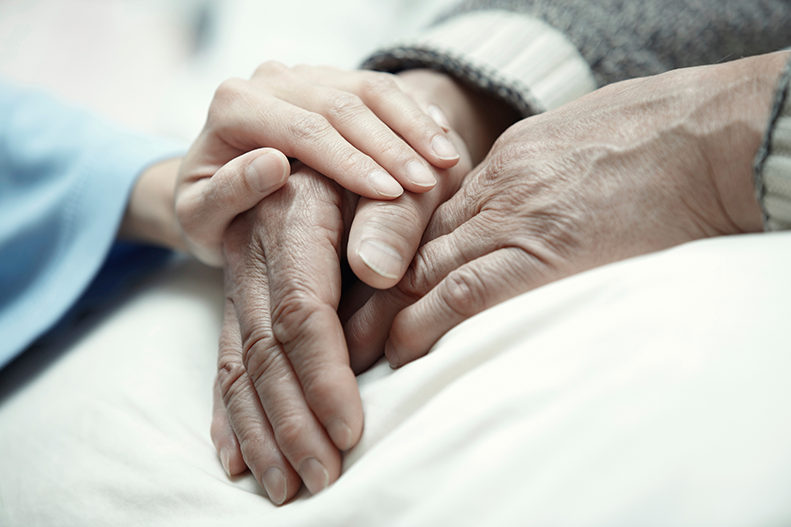Many people think palliative care is for patients who are in the final stage of life and have stopped treatments. However, that’s not true. Palliative care is for patients with a serious illness. People can receive palliative care at the same time that they are receiving disease related therapies. People often have symptoms due to their disease or treatment side effects that affect their quality of life.
Patients with a serious illness may also have worries about their future or how their health is affecting their family. Having an extra layer of support alongside of their specialty physician is what many patients find useful.
Janet Leahy MSN, ACHPN ,is the Advanced Practice Providers Supervisor for the UPMC Palliative and Supportive Institute. Below she discusses the common myths associated with this specialty.
Q: What Is Palliative Care?
Palliative care is a specialty that helps people with a serious or life-limiting illness. The care is based on the patient’s needs and not on their prognosis. They work to help ease symptoms and treatment side effects. For example, palliative care teams help patients on chemotherapy for cancer or dialysis for kidney disease. Assisting these patients may help to make treatments more tolerable to them.
Palliative care providers address patient’s symptoms. These symptoms can include:
- Fatigue
- Nausea
- Depression
- Pain
- Difficulty sleeping
- Anxiety
- Constipation
And others that may affect the patient’s quality of life
Palliative care teams help people by:
- Discussing the best treatment plan for symptoms with the patient, family and their other care providers
- Skilled communication regarding what the future may look like and what care would make sense based on individual values
- Serving as the central team in coordinating complex family meetings
- Inquiring about patient’s spirituals needs and connecting them to appropriate resources
Never Miss a Beat!
Subscribe to Our HealthBeat Newsletter!
Thank you for subscribing!
You can now select the specific newsletters you'd like to receive.
You are already subscribed.
Subscribe to more newsletters in our email preference center.
Sorry, an error occurred. Please try again later.
Get Healthy Tips Sent to Your Phone!
Q: What are the Common Misconceptions About Palliative Care?
The most common misconception about palliative care is that it’s for dying patients. Many people think that palliative care is the same as hospice. If you search it on the Internet, they often do come up together.
And yet, palliative care can improve a person’s overall quality of life. Many studies show that palliative care can actually help people live longer. A palliative care team can help patients complete their treatments and live healthier lives.
Palliative care teams can help many patients with serious illness including those who:
- Expect to recover fully from their illness.
- Expect to live with a severe chronic disease for years.
- Have a life-limiting diagnosis.
In short, palliative care is about reducing the burdens that comes with an illness, regardless of their prognosis.
Q: Is Palliative Care the Same Thing as Hospice Care?
A: Palliative care and hospice care have similarities and differences.
Both specialties focus on providing an additional layer of support to patients and families. They both assure that symptoms are well controlled, and that care is based on the patient’s goals and values.
However, hospice care occurs when the patient, physician or family has determined that there are no longer curative or life prolonging treatments available or that they no longer fit the goals of care.
Patients who elect to never start curative therapies would qualify for hospice care, even if they may have months to live. Hospice care is not just about the last few days of life.
Q: What Can I Expect from Palliative Care?
Based on your situation, you may see palliative care providers in the hospital or in an outpatient clinic. In certain areas, palliative care may be available in your home or in a skilled nursing facility
Your palliative care team will ask about the symptoms you are having. They may also discuss how you are coping with your illness and whether you have thought about what would be most important to you if your health does not improve. They may discuss who would help make medical decisions for you if you are unable to speak for yourself.
How Can a Person Access Palliative Care at UPMC?
Patients experiencing a serious illness or family members may ask their primary team to consult the palliative care team at the facility that they are receiving care. Many UPMC facilities have a team on site and some rural locations have access to virtual palliative care services.
Depending on your location, most palliative care teams are comprised of physicians, advanced practice providers and social workers. Some locations also include chaplaincy, behavioral or music therapists.
The overarching goal for the team is to support you at a very challenging time.
Editor's Note: This article was originally published on , and was last reviewed on .
About Palliative and Supportive Institute
At the UPMC Palliative and Supportive Institute, we have one goal: providing the top treatment for patients with serious, life-threatening illnesses. We want you or your loved one to have the highest quality of life, even when a cure is not possible. We will listen to your own wishes for care and build our support around you. We work closely with other UPMC health care professionals to provide complete support and services, both physical and emotional. We want to help you live with dignity and grace in life’s most difficult moments. Visit our website to find a provider near you.
